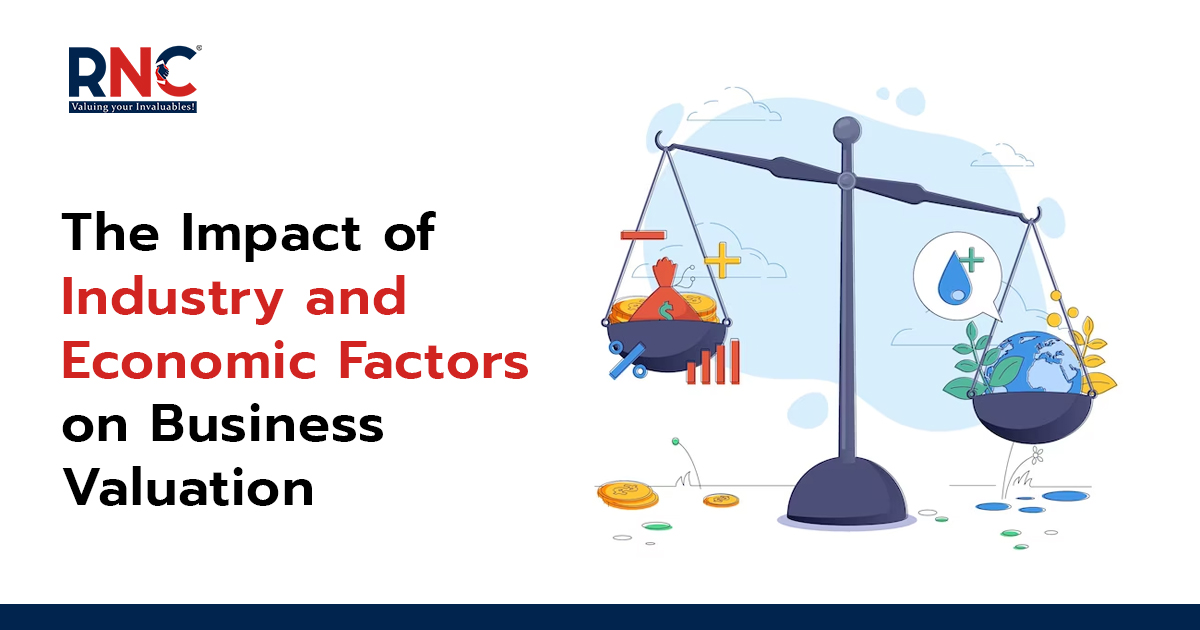
Business valuation is a critical process that determines the financial worth of a company. It involves assessing various factors that contribute to the company’s value, including industry dynamics and economic conditions. In this blog post, we will explore the significant impact of industry and economic factors on business valuation and highlight the importance of accurate valuations in making informed business decisions.
Read More: What Factors Are To Be Considered While Doing Business Valuation?
Key Takeaways
-
Industry and economy shape risk perception and growth potential
-
They influence multiples, discount rates, and cash flow forecasts
-
Fast-growing industries often get higher valuations
-
Negative economic cycles can depress fair values
-
Must document all external factor assumptions for compliance
Industry Factors:
1. Market Demand and Trends:
The demand for products or services within an industry is a vital consideration in business valuation. Valuation professionals assess the current market demand and identify trends that can impact the future growth and profitability of a business. Understanding the market dynamics helps determine the value of a company accurately.
2. Competitive Landscape:
The level of competition in an industry affects a company’s market share, pricing power, and overall value. Business valuation services consider the competitive position of a company by analyzing factors such as market share, customer loyalty, and barriers to entry. A company with a strong competitive advantage is likely to have a higher valuation.
3. Regulatory Environment:
Industries are subject to specific regulations and compliance requirements. Changes in regulations can impact a company’s operations, profitability, and risk exposure. Valuation experts consider the regulatory landscape to assess the potential risks and opportunities associated with a business, which can significantly affect its valuation.
Read : How Business Valuation Measures Economic Damages
Economic Factors:
1. GDP and Economic Growth:
The overall state of the economy and its growth rate have a direct impact on business valuations. During periods of economic expansion, businesses tend to perform better, leading to higher valuations. Conversely, economic downturns can negatively affect business valuations due to reduced consumer spending and lower corporate profits.
2. Interest Rates:
Interest rates affect the cost of capital and future cash flows, thereby influencing business valuations. Lower interest rates generally lead to higher valuations as the cost of borrowing decreases, making investment in a business more attractive. On the other hand, higher interest rates can lower a company’s value.
3. Inflation and Deflation:
Changes in price levels due to inflation or deflation can impact business valuations. Inflation erodes purchasing power, potentially affecting a company’s future cash flows and profitability. Valuation professionals consider inflationary or deflationary expectations when assessing a company’s value to ensure accuracy.
| Factor | Description | Impact on Valuation |
|---|---|---|
| Industry Growth Rate | Sector’s historical and projected growth | Higher multiples in fast-growing industries |
| Economic Conditions | GDP, inflation, interest rates | Affects discount rates and risk premiums |
| Competitive Landscape | Number and strength of competitors | Influences market multiples and pricing power |
| Regulatory Environment | Laws, policies, sector-specific norms | Impacts risk perception and compliance costs |
| Technological Disruption | Innovation and obsolescence risk | Alters future cash flow projections |
Conclusion:
Accurate business valuation is essential for various purposes, such as mergers and acquisitions, financial reporting, and strategic decision-making. The valuation process takes into account industry-specific factors and economic conditions that can significantly impact a company’s worth. Understanding market demand, industry trends, competitive landscape, regulatory environment, GDP growth, interest rates, and inflation is crucial in determining the value of a business.
To ensure accurate business valuations, it is advisable to seek the services of experienced professionals who possess a deep understanding of industry and economic factors.
Read Similar topics: Top 8 Situations Where Business Valuation is Needed
How Revenue Is Important in Business Valuation
Want industry-backed business valuation reports?
Book a Consultation with RNC Experts
FAQs :
1. How do industry trends affect business valuation?
Industry trends, such as technological innovation, demand growth, or regulatory changes, can increase or decrease a company’s valuation multiples.
2. How do economic conditions influence business valuation?
Economic conditions like GDP growth, inflation, and interest rates directly impact revenue projections, discount rates, and investment attractiveness, influencing overall valuation.
3. Which sectors in India are most affected by economic factors?
Sectors like real estate, infrastructure, and manufacturing are highly sensitive to interest rates and policy changes, while IT and pharma are more influenced by global demand trends.
4. Why should businesses consider macroeconomic factors in valuations?
Macroeconomic factors ensure valuations are realistic and future-proof. Ignoring them may lead to overvaluation or undervaluation, affecting investor trust and compliance.
5. Who can provide reliable business valuations in India?
Registered and certified valuers, such as RNC Valuecon LLP, provide professional valuations that consider industry benchmarks and economic conditions in line with Indian Valuation Stan

About the author:
Sahil Narula
Sahil Narula is the Managing Partner at RNC Valuecon LLP and a Registered Valuer with IBBI. He brings over a decade of experience in Valuation Services, Corporate Finance, and Advisory, having led numerous complex assignments under the Insolvency & Bankruptcy Code, 2016, Mergers & Acquisitions, Insurance, and Financial Reporting.
He is a regular speaker at national forums (ASSOCHAM, CII, ICAI, IBBI, Legal Era) and currently serves as Co-Chairman of ASSOCHAM’s National Council on Insolvency & Valuations and a member of CII’s Task Force on Insolvency & Bankruptcy.
🤝Connect with Sahil on LinkedIn.
